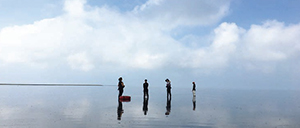By Stefanie Jackson
For the sixth time in a row, the National Science Foundation awarded the University of Virginia a six-year grant for its long-term ecological research project spanning 36 years on the Eastern Shore.
The Anheuser-Busch Coastal Research Center, in Oyster, The Nature Conservancy (TNC), and the Virginia Institute of Marine Science (VIMS) are among the organizations cooperating to conduct the ongoing research with the goal of understanding the relationships among the barrier islands, marshes, and coastal bays, said Karen McGlathery, the research project’s director.
For example, the barrier islands are protected by the marshes, which are in turn protected by oyster reefs, she said.
The current research trend represents a major shift since the project began in the 1980s, when each ecological area was studied in isolation.
One of the project’s most significant recent discoveries is that small storms do the most damage, not the big storms like Hurricane Sandy, McGlathery said.
Cora Johnston, director of the Oyster research lab, previously explained gentle waves lapping against the marsh cause more erosion than major storm surge, which covers the marsh, weakening wave action.
Researchers have also found an abundance of invasive seaweed in the seagrass undergoing restoration in the Shore’s coastal bays, but the seaweed is not necessarily a nuisance, because shorebirds are feeding on it, McGlathery said.
The seagrass restoration project, spearheaded by TNC and VIMS, may play an important role in climate change and what McGlathery calls “marine heat waves” – when water temperature highs rise above normal.
Seagrass removes carbon dioxide from the atmosphere at high rates.
The seagrass restoration also improves water quality and increases biodiversity, she said.
McGlathery has studied coastal waters and seagrass from Bermuda to Denmark, so her current position is a natural fit. She has worked on the UVA project since 1996 and has directed it for the last 15 years.
Because TNC provides the Anheuser-Busch Coastal Research Center with the land to study and the lab provides the conservation organization with landscape management resources, McGlathery calls their relationship the “perfect marriage.”
Sign in
Welcome! Log into your account
Forgot your password? Get help
Password recovery
Recover your password
A password will be e-mailed to you.



